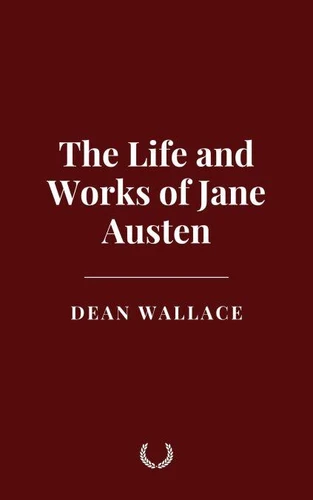The Life and Works of Jane Austen
Par :Formats :
Disponible dans votre compte client Decitre ou Furet du Nord dès validation de votre commande. Le format ePub est :
- Compatible avec une lecture sur My Vivlio (smartphone, tablette, ordinateur)
- Compatible avec une lecture sur liseuses Vivlio
- Pour les liseuses autres que Vivlio, vous devez utiliser le logiciel Adobe Digital Edition. Non compatible avec la lecture sur les liseuses Kindle, Remarkable et Sony
 , qui est-ce ?
, qui est-ce ?Notre partenaire de plateforme de lecture numérique où vous retrouverez l'ensemble de vos ebooks gratuitement
Pour en savoir plus sur nos ebooks, consultez notre aide en ligne ici
- FormatePub
- ISBN8227187512
- EAN9798227187512
- Date de parution13/01/2025
- Protection num.pas de protection
- Infos supplémentairesepub
- ÉditeurBig Dog Books, LLC
Résumé
Jane Austen's novels, through their sharp wit and keen social commentary, offer an insightful critique of the class and gender dynamics of Regency England, particularly focusing on themes of marriage, social status, personal growth, and morality. Central to Austen's works is the exploration of social class, particularly the constraints and expectations placed on women in a society where marriage is not only an emotional union but also a social contract with profound economic and social implications.
Through memorable characters such as Elizabeth Bennet, Anne Elliot, and Emma Woodhouse, Austen deftly portrays how personal identity, love, and moral values intersect with the rigid class structures of her time. The settings in her novels are not mere backdrops but serve as symbolic representations of social hierarchies and moral landscapes, with locations like Pemberley and Mansfield Park playing critical roles in the development of characters' relationships and individual growth.
Austen's use of irony and humor further allows her to engage with the contradictions and absurdities of her society, providing both entertainment and profound reflections on the nature of human relationships, social mobility, and the pursuit of individual autonomy. Her enduring legacy lies in her ability to craft timeless stories that continue to resonate with readers by engaging with universal themes, while also offering a pointed critique of the societal norms that defined her era.
Through memorable characters such as Elizabeth Bennet, Anne Elliot, and Emma Woodhouse, Austen deftly portrays how personal identity, love, and moral values intersect with the rigid class structures of her time. The settings in her novels are not mere backdrops but serve as symbolic representations of social hierarchies and moral landscapes, with locations like Pemberley and Mansfield Park playing critical roles in the development of characters' relationships and individual growth.
Austen's use of irony and humor further allows her to engage with the contradictions and absurdities of her society, providing both entertainment and profound reflections on the nature of human relationships, social mobility, and the pursuit of individual autonomy. Her enduring legacy lies in her ability to craft timeless stories that continue to resonate with readers by engaging with universal themes, while also offering a pointed critique of the societal norms that defined her era.
Jane Austen's novels, through their sharp wit and keen social commentary, offer an insightful critique of the class and gender dynamics of Regency England, particularly focusing on themes of marriage, social status, personal growth, and morality. Central to Austen's works is the exploration of social class, particularly the constraints and expectations placed on women in a society where marriage is not only an emotional union but also a social contract with profound economic and social implications.
Through memorable characters such as Elizabeth Bennet, Anne Elliot, and Emma Woodhouse, Austen deftly portrays how personal identity, love, and moral values intersect with the rigid class structures of her time. The settings in her novels are not mere backdrops but serve as symbolic representations of social hierarchies and moral landscapes, with locations like Pemberley and Mansfield Park playing critical roles in the development of characters' relationships and individual growth.
Austen's use of irony and humor further allows her to engage with the contradictions and absurdities of her society, providing both entertainment and profound reflections on the nature of human relationships, social mobility, and the pursuit of individual autonomy. Her enduring legacy lies in her ability to craft timeless stories that continue to resonate with readers by engaging with universal themes, while also offering a pointed critique of the societal norms that defined her era.
Through memorable characters such as Elizabeth Bennet, Anne Elliot, and Emma Woodhouse, Austen deftly portrays how personal identity, love, and moral values intersect with the rigid class structures of her time. The settings in her novels are not mere backdrops but serve as symbolic representations of social hierarchies and moral landscapes, with locations like Pemberley and Mansfield Park playing critical roles in the development of characters' relationships and individual growth.
Austen's use of irony and humor further allows her to engage with the contradictions and absurdities of her society, providing both entertainment and profound reflections on the nature of human relationships, social mobility, and the pursuit of individual autonomy. Her enduring legacy lies in her ability to craft timeless stories that continue to resonate with readers by engaging with universal themes, while also offering a pointed critique of the societal norms that defined her era.























